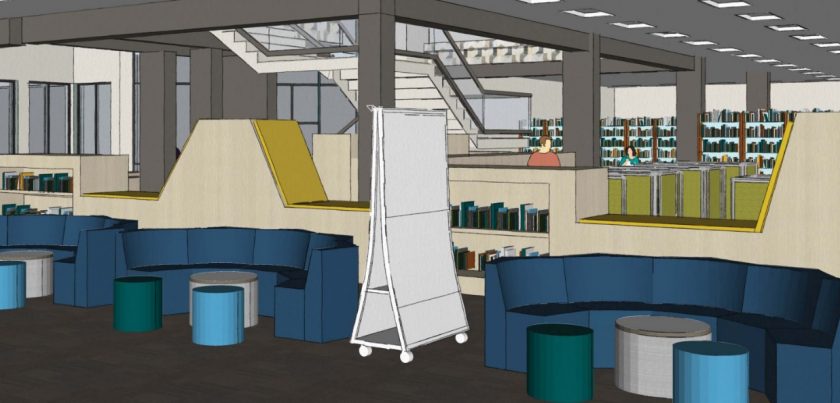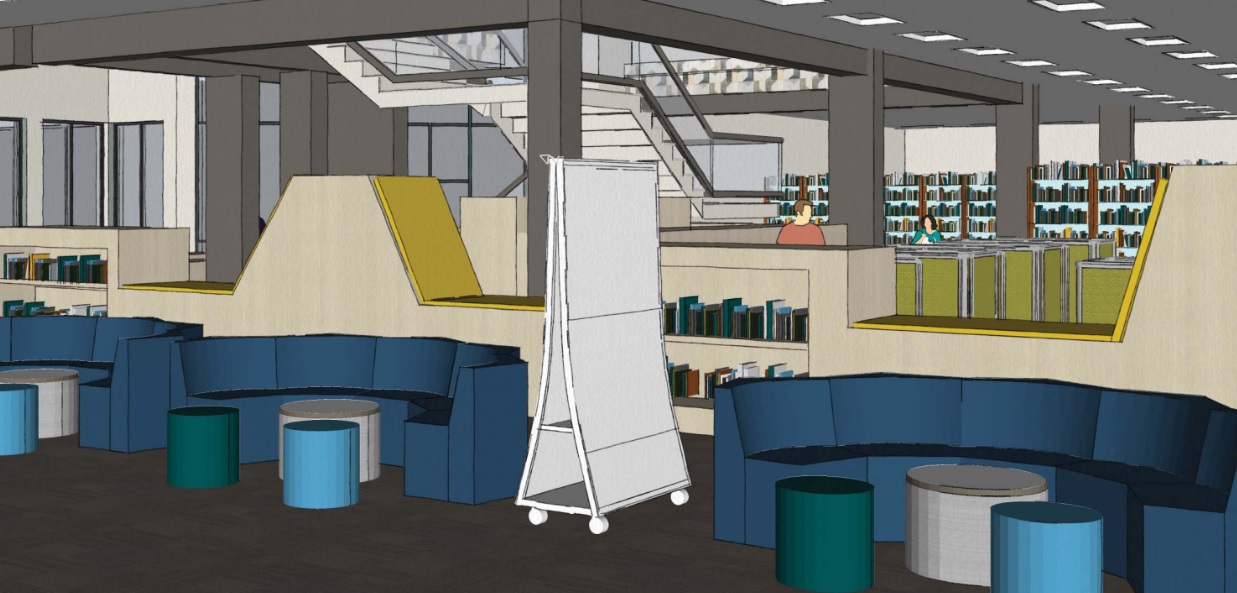
Concept art of the library from a 2018 presentation
Over the summer, a number of renovations were made to the Jane Bancroft Cook Library. These included the installation of a new cafe, a set of new furniture and the removal of nine public computers. The reactions from the student body were mixed. Some students would even go so far as to say that the changes to the library significantly degraded it. Chief among those is Library Representative and second-year Adam Johnson, who strongly denounced the new changes in an interview with the Catalyst on Sept. 12. But Johnson was not finished with just announcing his displeasure. He also filed a number of public records requests, via the Florida Sunshine Law, that yielded some surprising information.
The cost of the library renovations was $379,701.80. Put into perspective, that’s roughly the same amount as the in-state tuition of 54 students. Specific items included two high-end coffee machines—costing over $10,000 together—and a furniture/bookshelf amalgam called “Arthur”—costing over $79,000 by itself. These funds came from the alumni-backed New College Foundation. Some students believe that the money could have been better spent elsewhere.
According to a survey conducted by Johnson, while a large proportion of students are happy with the changes, there are a number of common concerns. The three most pressing were the removal of the nine public computers that once filled the tables (four of which have been reinstated), the perceived lack of quiet study spaces and a worry about how the decision was made seemingly unilaterally by the administration.
“[The big issue is] the lack of student involvement,” Johnson said, expressing the frustration of many students. “That’s the principle behind it. This was a complete top-down decision.”
However, despite the mixed response from students, the administration is overall happy with the decision.
“A lot [of future renovations are] going to be based on how this gets used, what it is we’re hearing from students and what it is we’re hearing from faculty,” Brian Doherty, dean of the library, said as he looked over the ground floor of the library from his second story office window. Throughout our conversation, he would motion to the floor-to-ceiling window, pointing out examples of the broader trends he was noticing.
The library, before this summer, had been filled with much of the same furniture since 1986. In fact, before Doherty joined New College in 2009, the library as a whole was much the same as it had been when it was constructed. It was through top-down action on Doherty’s part that library staples like the Col-Lab were established.
But the long-term plans for the library seem to be more student-driven than the most recent library renovations. Administration is keeping a close eye on how students are using the library, observing and analyzing carefully before making any future plans for further renovations. Already, behavioral patterns among the students are being cataloged and pondered.
“Some of it is successful, some of it we still have a lot of questions about whether or not it is successful,” Doherty said. “Looking to the numbers, this library hasn’t been this vibrant in the nine years I’ve been here. We’re getting students in here that we haven’t seen before.”
These recent changes are only the first step in what administration hopes will be a series of upgrades to the library. When asked about any future plans for the library, Provost Barbara Feldman had this to say: “This is phase one. I don’t know how many phases the rest will come in … We have to raise money. What I’m hoping is that when people come, people with money, and see what we’re doing for New College students, somebody will help fund what else we need to.”
Securing future funding seemed to be a major driver for the renovations. The general thought is that people like to give when they see work already being done, so the best way to have money for improvements is to start improving.
All of this can leave a student wondering what impact they can have on the future of the library. While merely going to the library will help the decision-making process going forward, direct communication with Feldman (bfeldman@ncf.edu) and Doherty (bdoherty@ncf.edu) is the best way to voice one’s specific desires for the library’s future.

